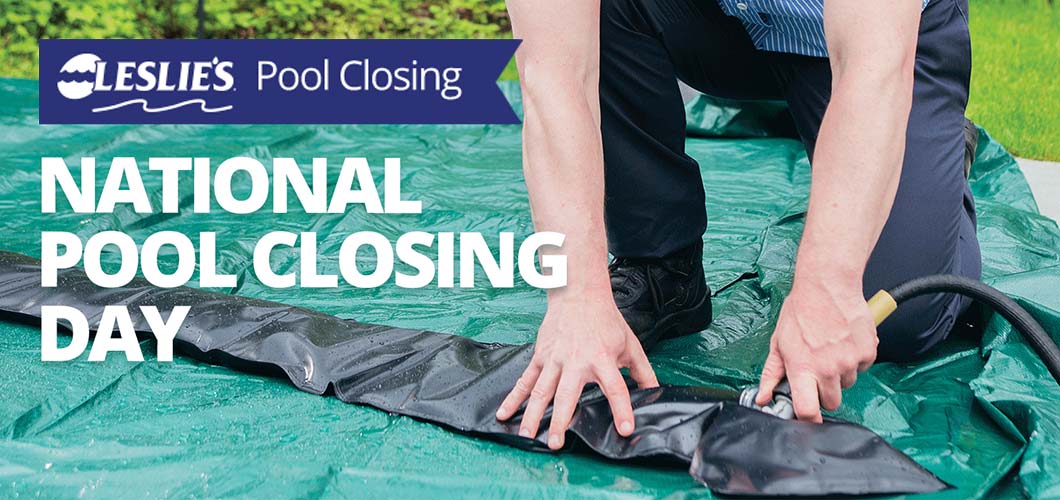
National Pool Closing Day
Opening your pool for the season is often a great event for you and your family. But just as opening your pool is important, closing it is, as well. To help remind everyone to properly prepare their pool for the off-season, we recognize National Pool Closing Day, which falls on the third Saturday in September.
Why You Should Close Your Pool
Closing your pool during the winter off-season is important, because if you don’t, you’ll have significant headaches in store when spring/summer rolls around. There are many reasons why closing a pool correctly is so important, including increased chances of algae growth, advanced staining and scaling on pool surfaces, and in the worst cases, damage to your pool equipment, plumbing, or overall structure.
To put things in perspective, if you fail to properly close your pool, opening it will be more costly to set your pool back on the right track again. This can all be avoided if the proper measurements are taken to close your pool before the winter months arrive. Seems like an obvious choice to us!
BONUS TIP: Need help closing your pool? Call or stop by your local Leslie's to ask about our pool closing services.
How to Properly Close Your Pool
1. Clean up dirt and debris in your pool

Start by skimming large debris out of the pool with a leaf rake or skimmer net. Scrub your pool walls and floors with a pool brush attached to a telescoping pole; ensure that you're getting into the nooks and crannies to the best of your ability.
Brushing your pool will kick up any sediment hanging around, as well as disturb the beginnings of any algae spores. Manually vacuum all the contaminants you kicked up while brushing. You can also entrust your automatic pool cleaner to do the job for you, if you own one.
2. Check your water’s chemistry, and add winterizing chemicals

First and foremost, you must check the water chemistry in your pool. Depending on the result, balance the pH, Total Alkalinity, and Calcium Hardness levels. Did you know that balancing the chemicals in your pool water before closing actually protects it from chemistry problems that can occur over the winter months?
Once the water is properly balanced, we also suggest shocking your pool and adding algae remover. This will kill any remaining bacteria and prevent algae from growing in the water.
It’s advised that you circulate your pool completely for 8 or more hours after adding chemicals before you go to the next step.
BONUS TIP: Looking for an easy solution to winterizing your pool? Leslie's Pool Closing Kits take the guesswork out of which chemicals your pool needs. Each kit includes Fresh 'N Clear chlorine-free pool shock, a bottle of Algae Control, and stain and scale prevention products. All you have to do is select the right kit according to the size of your pool. You can learn more about them in our blog.
3. Turn off equipment, and lower the pool water level

Before removing water from the pool on pool closing day, turn off the power to your pool equipment. Using a submersible pump, lower the water level in your pool. It’s best if you lower the water at least 2 inches below the lowest return line for winterizing the lines. Alternatively, use a blowout device and lower water about 4–6 inches below the skimmer. If you own a fiberglass or vinyl pool, we don't recommend draining much water — always refer to the pool builder's or manufacturer's instructions for winterizing procedures.
Lowering the water level when you’re closing the pool helps prevent freeze damage to the tile line, and in some instances, can prevent overflow. If you live in an area that receives lots of winter moisture, it’s a good idea to check the water level occasionally while the pool is closed.
4. Drain pool equipment, and winterize plumbing

To prevent any damage from freezing, it’s best to drain and clean all pumps, filters, heaters, cleaners, and other equipment for the winter. If your equipment or plumbing has leftover water inside, you risk the water freezing, expanding, and cracking your equipment when the temperature drops. Remove all drain plugs from equipment, and store them in the pump basket for safekeeping. If possible, equipment should be stored indoors or under cover for the winter.
To protect your plumbing, clear out the lines with a blower, and plug the returns with winter plugs. For added protection, add swimming pool antifreeze to the plumbing lines according to label instructions. Pool antifreeze is good to use as a safeguard, just in case a plug fails. Finally, add a Gizzmo, Skimguard, or skimmer plug to protect the skimmer against freeze expansion.
5. Add a winter cover

Last but not least, install a winter cover for your pool. Before getting started, remove all ladders, hoses, or anything else that's in or around the pool. If you already own a winter cover or a safety cover, ensure that it fits correctly and inspect it for holes or damage in the surface material. You don't want there to be spots where debris can get through to the water. It’s also suggested that water bags be used to secure your inground pool winter cover, or use an air pillow with either wall bags or a cable and winch to secure an above ground pool winter cover. If using a safety cover, ensure the straps and anchors are in good repair. This maximizes the security of your pool during those harsh winter months.
CLICK HERE to download Leslie's FREE Pool Closing Guide and Checklist
In the weeks leading up to National Pool Closing Day, check to make sure you have all the pool closing supplies you'll need to make the process go smoothly. Have all your water balancing supplies, pool closing chemicals, and winter accessories ready to go.
If you're re-using your winter cover from last year, take a look at it to make sure it's still in good condition. If it's not, make plans to purchase a new one before you start the pool closing process. As always, feel free to stop by or call your local Leslie's for help with all your pool closing questions. You can also check out the Pool Closing section of our blog for more helpful tips and tricks. If you're stuck or need help with the winterization process, schedule at-home services with a certified Leslie's pool technician.
A properly closed and winterized pool will be significantly easier to open in the spring, and we're here to help!